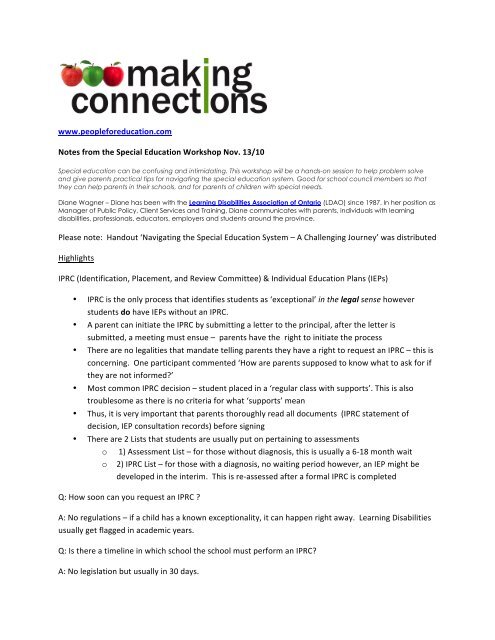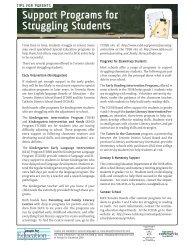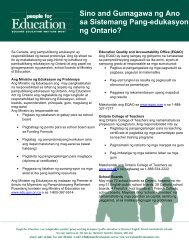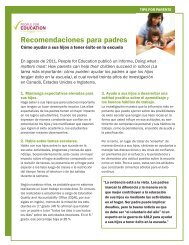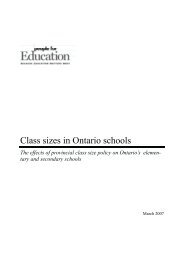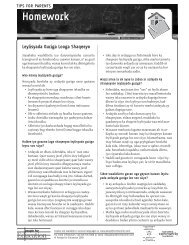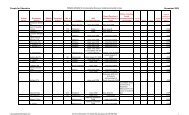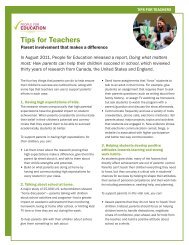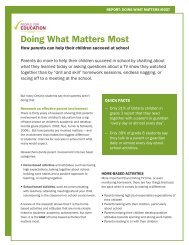Notes and Resources from the Special Education Workshop
Notes and Resources from the Special Education Workshop
Notes and Resources from the Special Education Workshop
You also want an ePaper? Increase the reach of your titles
YUMPU automatically turns print PDFs into web optimized ePapers that Google loves.
www.peopleforeducation.com <br />
<strong>Notes</strong> <strong>from</strong> <strong>the</strong> <strong>Special</strong> <strong>Education</strong> <strong>Workshop</strong> Nov. 13/10 <br />
<strong>Special</strong> education can be confusing <strong>and</strong> intimidating. This workshop will be a h<strong>and</strong>s-on session to help problem solve<br />
<strong>and</strong> give parents practical tips for navigating <strong>the</strong> special education system. Good for school council members so that<br />
<strong>the</strong>y can help parents in <strong>the</strong>ir schools, <strong>and</strong> for parents of children with special needs.<br />
Diane Wagner – Diane has been with <strong>the</strong> Learning Disabilities Association of Ontario (LDAO) since 1987. In her position as<br />
Manager of Public Policy, Client Services <strong>and</strong> Training, Diane communicates with parents, individuals with learning<br />
disabilities, professionals, educators, employers <strong>and</strong> students around <strong>the</strong> province. <br />
Please note: H<strong>and</strong>out ‘Navigating <strong>the</strong> <strong>Special</strong> <strong>Education</strong> System – A Challenging Journey’ was distributed <br />
Highlights <br />
IPRC (Identification, Placement, <strong>and</strong> Review Committee) & Individual <strong>Education</strong> Plans (IEPs) <br />
• IPRC is <strong>the</strong> only process that identifies students as ‘exceptional’ in <strong>the</strong> legal sense however <br />
students do have IEPs without an IPRC. <br />
• A parent can initiate <strong>the</strong> IPRC by submitting a letter to <strong>the</strong> principal, after <strong>the</strong> letter is <br />
submitted, a meeting must ensue – parents have <strong>the</strong> right to initiate <strong>the</strong> process <br />
• There are no legalities that m<strong>and</strong>ate telling parents <strong>the</strong>y have a right to request an IPRC – this is <br />
concerning. One participant commented ‘How are parents supposed to know what to ask for if <br />
<strong>the</strong>y are not informed?’ <br />
• Most common IPRC decision – student placed in a ‘regular class with supports’. This is also <br />
troublesome as <strong>the</strong>re is no criteria for what ‘supports’ mean <br />
• Thus, it is very important that parents thoroughly read all documents (IPRC statement of <br />
decision, IEP consultation records) before signing <br />
• There are 2 Lists that students are usually put on pertaining to assessments <br />
o 1) Assessment List – for those without diagnosis, this is usually a 6-‐18 month wait <br />
o 2) IPRC List – for those with a diagnosis, no waiting period however, an IEP might be <br />
developed in <strong>the</strong> interim. This is re-‐assessed after a formal IPRC is completed <br />
Q: How soon can you request an IPRC ? <br />
A: No regulations – if a child has a known exceptionality, it can happen right away. Learning Disabilities <br />
usually get flagged in academic years. <br />
Q: Is <strong>the</strong>re a timeline in which school <strong>the</strong> school must perform an IPRC? <br />
A: No legislation but usually in 30 days.
General Comments <strong>and</strong> Concerns: <br />
• Parents must be informed of <strong>the</strong>ir rights – “knowing” how to ask questions re: IPRCs/IEPs <br />
• Parents need to be empowered <br />
• We need to properly fund our schools for special needs equipment/software <br />
• Interpretation is available for IPRC meetings <br />
• When an IEP is in place, it is better to help/collaborate with <strong>the</strong> teacher underst<strong>and</strong> your child’s <br />
needs ra<strong>the</strong>r <strong>the</strong>n pointing out a teacher is not following <strong>the</strong> IEP <br />
Tips for Parents: <br />
• Be reasonable – don’t be angry, ask a lot of questions <br />
• Make accommodations for your child, find alternatives <br />
• Always read <strong>the</strong> entire document <strong>and</strong> underst<strong>and</strong> what it means <strong>and</strong> make sure you agree <br />
with what it says <br />
• Take time to think about it – don’t sign at <strong>the</strong> meeting, take it home <strong>and</strong> review it <br />
• Advocate for your child – ask what you can do, obtain contact information of professionals <br />
who are involved <br />
More <strong>Resources</strong> <strong>from</strong> People for <strong>Education</strong>: <br />
<strong>Special</strong> <strong>Education</strong> Tip Sheet for Parents: All students will have times when <strong>the</strong>y<br />
struggle with schoolwork or with school life. But some students may need extra support<br />
<strong>from</strong> a special education program.<br />
Click on <strong>the</strong> language of your choice to read <strong>the</strong> <strong>Special</strong> <strong>Education</strong> tip sheet:<br />
English, Arabic, Chinese, Farsi, Filipino, French, Korean,<br />
Punjabi, Russian, Somali, Spanish, Tamil, Urdu.<br />
Or visit People for <strong>Education</strong>’s resource page: http://www.peopleforeducation.com/parents/specialed<br />
Teacher <strong>Resources</strong> can also be very helpful to parents: <br />
“<strong>Special</strong> <strong>Education</strong>: A Guide for Educators”, available on-line at:<br />
www.edu.gov.on.ca/eng/general/elemsec/speced/guide.html<br />
Teachers’ Gateway to <strong>Special</strong> <strong>Education</strong> is a new website full of resources: http://teachspeced.ca/


